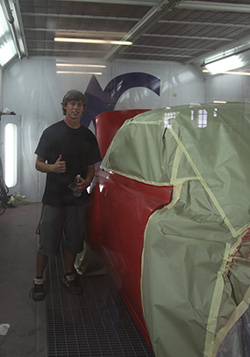
After two years, Amarillo College reintroduced an auto collision certification program this fall.

After two years, Amarillo College reintroduced an auto collision certification program this fall.
By Shelby Koontz
Ranger Reporter
At the beginning of the fall semester, Amarillo College reintroduced the auto collision certification program after a two-year hiatus and has chosen 23-year industry veteran Eddie Casias to lead students in the program.
“Everywhere, the auto body repair industry lacks trained entry-level workers and is struggling to replace retiring craftsmen,” Casias said. “Every shop has trouble finding people.”
AC officials believe that because of Casias’ years of experience, his instruction can lead students to become good craftsmen.
“The program is a two-year course,” said M.J. Coats, a partner in the program and also part of AC’s college relations department.
“And although it can get a little dirty, for students who don’t lean toward an occupation in health care but love to make a difference using their hands, technical education is an excellent alternative for them.”
The program includes hands-on work and has classes that range from Basic Refinishing to Major Collision Repair and Panel Replacement.
The program gives students a wide range and basic knowledge of what a good craftsmen needs to know.
“My goal is to take these students and get them ready for any shop,” Casias said.
Casias’ goal is to prepare new students to be entry-level body shop workers who can start as a helper or as an apprentice and move up in the industry.
“The program is given many vehicles, ranging from trucks, to semis to buses donated from the city of Amarillo,” Coats said.
“The program also purchased a 2013 Lincoln hybrid MKZ for mechanical students so that they may work on and understand the way newer models work and function.”
Although the industry can be grimy and dirty, she said the program’s result is worthwhile.
“There is money in the industry as long as the working student gets their needed credentials,” Coats said.
Because the student is able to complete this short course in only nine months, which takes two semesters, landing a job shouldn’t be that difficult.
Casias’ contacts in the industry will help students get interviews after the completion of the course.
“Another one of my goals is to get students in ready shape to begin work in the shops of their choice,” he said, “and lastly, to make this the finest program AC has to offer.”

Leave a Reply